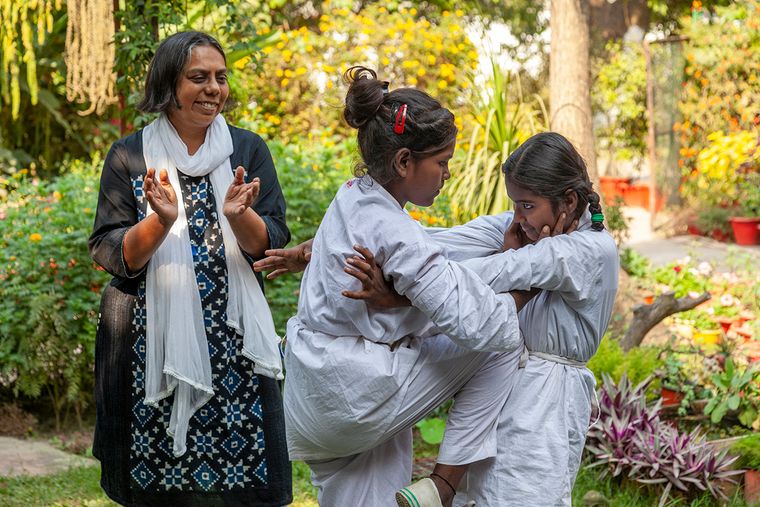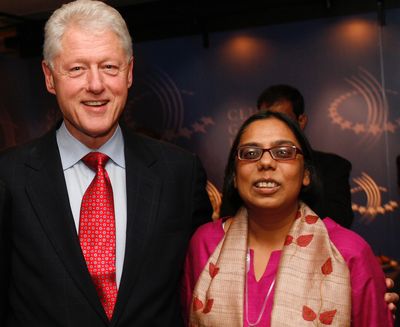Every year, when a damp mist hangs over the lentil fields near Girls Bazaar, the mela arrives in Ruchira Gupta’s book, I Kick and I Fly. An integral part of it is the cheap strip dance that takes place in the dance tents, where girls in skimpy clothes gyrate to music on the makeshift stage. The younger ones stuff their bras with rags and plastic balls to make their breasts look bigger. The book’s heroine, Heera, and her cousin Meera di used to lift the tarpaulin many times and watch these girls from the sidelines. Until Meera di becomes one of them.
Heera watches in horrified fascination as Meera di dances in a tight red dress, while a boy pours buckets of water on her to make her clothes stick to her body. One day, Heera fears, she too will become one of these girls bought by the owners of the dance parties from their fathers or guardians. The owners then pay for their marriage to a banana plant in a ceremony called Bisi Bele, and then auction the girl’s virginity to the highest bidder.
It is a scene vividly described, as by one who has seen many similar scenes in her life. Gupta is no stranger to the intricacies of sex trafficking, having spent more than two decades fighting it. That is why the world she creates in her debut novel feels so authentic.
But this annual fair, the ramshackle tents, the dancing girls, and the relentless pimps are just the backdrop. The story really begins when Heera watches a group of girls being taught kung fu near her school. As she joins them, the self-defence classes become her ticket out of this suffocating world of drugs, gambling, and prostitution.
“I began writing the book in 2014, when a girl from my NGO Apne Aap won a gold medal in karate,” says Gupta. “I remember how difficult it was to keep her in school when her family was pressurising her mother to sell her into prostitution. Despite that she stuck on. She took on the bullies, the stigma and the social pressure. And through all of that, she won the gold medal. I felt proud of her and felt I should tell her story.”
In some parts, the book―described as “irresistible” by feminist author Gloria Steinem and as “essential reading” by actor Ashley Judd―feels too good to be true. Like when Heera goes to the US as part of a kung fu exchange programme and comes back to find that her family has moved into a new home and her mother now owns a paan shop. Yet, Gupta’s work is a testament to the fact that change is possible. There were 72 brothels in the lane where Apne Aap started. Now there are only two. Someone like Heera’s mother really has a paan shop and someone like Mira di is a seamstress now, writes Gupta at the end of her book. The cattle fair is no longer allowed to bring dance or orchestra groups.
It all began in the 1990s, when Gupta was researching another story in the hills of Nepal as a journalist. She writes about how she came across rows of villages with missing girls, followed the trail and found that a supply chain existed from these remote hamlets to the brothels of India. Girls as young as 12 were locked up in tiny rooms in Kolkata, Delhi and Mumbai for years, and sold for a few rupees every night. She exposed the horror in the documentary The Selling of Innocents (1996), which won an Emmy in News and Journalism.
As she went onstage to receive the award, she could see the bright lights before her. But beyond the lights, all she could see were the eyes of the mothers who had risked all to speak out in her documentary. In that moment, Gupta decided that she was going to use her Emmy not to build a career in journalism, but to help these women.
The first thing she did afterwards was to travel to Mumbai. She sat on a straw mat in the brothels and told the women about the Emmy. I have told your story, she told them. Now what do you want? They told her four things: a school for their children, a room of their own, an office job and punishment for those who bought and sold them. So, this became Gupta’s business plan when she started her NGO. She testified before the UN and the US Senate. Her efforts led to the passage of the UN Protocol to end human trafficking and the first US Trafficking Victim Protection Act. She has spoken in the French Assembly, the Icelandic Parliament, the South African Parliament and the Indian Parliament. She has won several awards for her activism, including the Clinton Global Citizen Award in the US and the National Order of the Legion of Honour in France.
It has not been easy though. Her staff members have been stabbed. Criminals would turn up at her home and threaten to kill her, to which she would laugh and reply: “My destiny is not in your hands. It is written somewhere else.” Cops would heckle her. She was always short of funds. In between, she got cancer. Once she was interviewing some women in a brothel in Mumbai when a man walked in and held a knife to her throat. It was a small room with a narrow door and a window with iron bars. She was sure he was going to kill her. Then, the 22 women in the room surrounded her. “If you want to kill her, you’ll have to kill us first,” they told him. The man walked away. “That’s when I realised the power of women’s collective action,” says Gupta.
There is a moment in the book when Heera looks at Mira di and resolves to rekindle the laughter and light in her eyes. “I will overcome my fears for her,” Heera decides. “I will fight for my future, for the dreams that she could never make come true for herself.” It is a pivotal moment that marks the difference between the two girls―one who gives in to her fate and the other who fights it. And in this long and hard fight, Gupta and her team help the girls in whatever way they can―by procuring ration cards and government IDs for them, enrolling them in schools, building low-cost houses for them, and rescuing them from pimps. Most of all, she equips them with that weapon whose value cannot be quantified―hope.
I Kick and I Fly
By Ruchira Gupta
Published by Rock the Boat (distributed by HarperCollins India)
Price Rs499; pages 336





